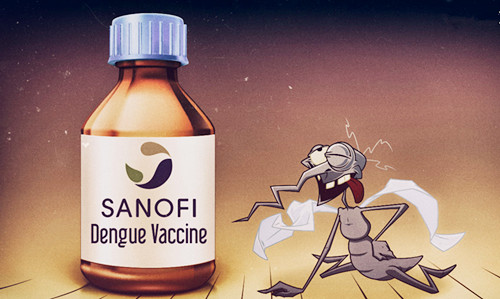Philippines’ launches legal action after Sanofi refuses to refund over dengue vaccine damages
February 7, 2018
Source: Pharmafile
 1,021
1,021

Sanofi has refused both requests from the Government of the Philippines to refund used doses of its Dengvaxia vaccine as well as the costs of medical treatment of first-time dengue patients who were harmed after its use in the nation’s vaccination programme of 837,000 children.
Sanofi had previously agreed to refund the costs of the unused doses of its controversial vaccine, but would not extend this to cover the used doses: “Agreeing to refund the used doses of Dengvaxia would imply that the vaccine was ineffective, which is not the case,” the company said.
“If the Department of Health decides to reinstate the community-based dengue vaccination programme following a more complete evaluation of the new data on the vaccine, Sanofi Pasteur would be willing to provide new doses of the vaccine free of charge,” the pharmaceutical firm said. “These new doses would allow people who previously received one or two doses of the vaccine in the public programme to complete the three-dose schedule and, thus, have the opportunity to benefit from the full potential of Dengvaxia’s ability to protect against dengue.”
The company also refused to set up an indemnification fund for victims of the drug, maintaining that, according to an independent expert panel, there was no proven link between the use of Dengvaxia and the reported deaths of three children. Following this move, the Philippines’ Department of Health was advised to initiate “blacklisting processes” against the French drugmaker.
“Since they don’t want to pay the refund, let’s begin with the legal process, at first, administratively. The DoH should initiate blacklisting processes vs Sanofi. When this blacklisting process gets going, the DoH can make their case there if indeed, Dengvaxia caused the deaths of the children who were vaccinated,” remarked Representative Rodel Batocabe, of the country’s Ako Bicol party and a member of the Committee of Health. “In the same vein, the blacklisting procedure will also give the Sanofi the venue to prove that they have no liability over the children’s deaths. Let’s quit all the talk.”
Representative Robert Ace Barbers of Surigao del Norte supported the notion, adding: “If it is a local supplier, it would have been immediately blacklisted. Why do we fear a multinational company? If it puts the lives of 700,000 children at risk, then they should be held liable.”
Meanwhile, the Public Attorney’s Office revealed that they had launched legal action aginst Sanofi and representatives and Janette Garin, who led the immunisation programme as Secretary of the Philippine Department of Health, after its own forensic examination discovered that 10-year-old Anjielica Pestilos died from extensive bleeding of the heart and stomach within a week of receiving Sanofi vaccine.
By Ddu
Read more on
- Drugdu.com’s 4 most Popular Veterinary APIs and Veterinary medicine Suppliers September 6, 2018
- 4 Pharmaceutical Machinery Packaging and Materials Suppliers September 6, 2018
- 3 ENT Equipment and Medical Anaesthesia Equipment Suppliers September 6, 2018
- Need Natural Plant Extracts? Here are 4 Suppliers! September 6, 2018
- Healthcare Products & Food Additives Suppliers for International Companies September 6, 2018
your submission has already been received.
OK
Subscribe
Please enter a valid Email address!
Submit
The most relevant industry news & insight will be sent to you every two weeks.



